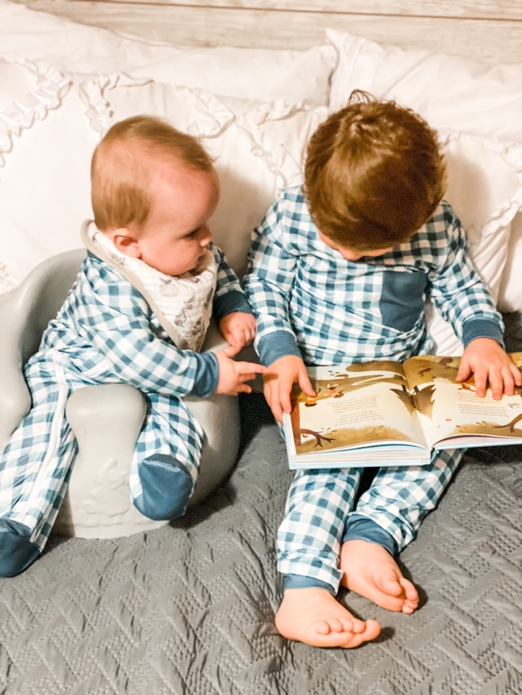The Earlier – The Better: Reading During the Earliest Years
By Mary Mills

One of my most favorite moments as aunt is when my two-year-old nephew runs to me with a book in his hand and ask me to read it to him. Although, it is the same book every time, I read it without any hesitation because I know repetition and children’s interest is a vital part of learning and development during early childhood. His 6-month-old brother now joins our reading sessions, which makes those moments even more special.
Older brother, Holden, takes the lead by pointing out and labeling all of the animals, tractors, and fields in his favorite book, ‘Goodnight, Johnny Tractor.’ Some may question the impact of introducing books to young infants but research dictates that it is never too early to begin the excellent habit of reading to your children during their earliest years. Baker Thomas joined our reading sessions when he was around 2-months-old. Recently, I have noticed him responding and interacting more while reading books with him.
As an early childhood professional, I have observed many beneficial factors of introducing books during the earliest years. We are going to explore 5, of the many, benefits of reading during early childhood.
Brain Development:
During the first three years of a child’s life, their brain develops at an astounding rate. Reading with young children stimulates optimal patterns of brain development, which helps build strong pathways in the brain and enhances their thinking, speech, and early literacy skills.
Language Acquisition:
We all know that children love to mimic adults, particularly the important adults in their lives. What we may not be aware of is that babies learn language by mimicking. Reading is an effective way to expose young children to a variety of vocal patterns.
Visual Connection:
Reading and labeling pictures in the book can help children make the connection between words and images. The older Holden gets, the more interactive our reading sessions get. He now points and identifies the images in the book. It is very important to keep the children engaged by asking open-ended questions and keeping them involved.
Formation of Nurturing & Positive Relationships:
Reading to young children is a great way to form nurturing and positive relationships. The one-on-one time while reading to young children helps form a secure attachment with your little ones.
A Book Lover:
If children are read to during their early years, they will remember those precious moments which will enhance their love for reading.
School readiness begins at birth. Babies begin to learn the skills they need for reading from the everyday interactions they have with the trusted adults in their lives. The more you can incorporate reading books into your everyday routines, the greater the bond through family learning and engagement.
Mary Mills
Director of Early Childhood Cornerstones Program
mary@cdl.org

Leave a Reply